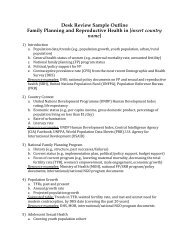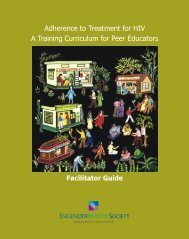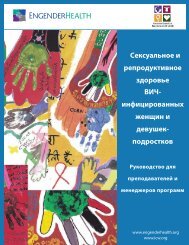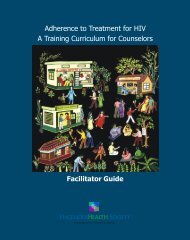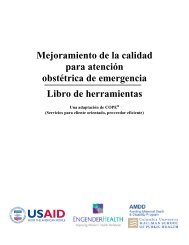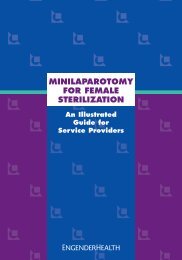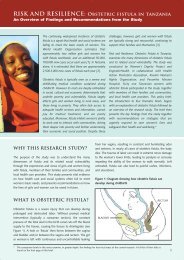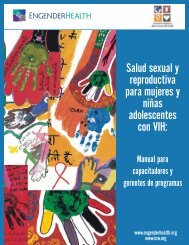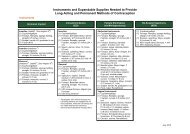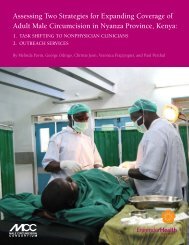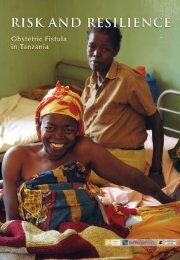Help-Seeking Pathways and Barriers for ... - EngenderHealth
Help-Seeking Pathways and Barriers for ... - EngenderHealth
Help-Seeking Pathways and Barriers for ... - EngenderHealth
You also want an ePaper? Increase the reach of your titles
YUMPU automatically turns print PDFs into web optimized ePapers that Google loves.
C. The Legal <strong>and</strong> Policy Framework <strong>for</strong> GBV in Tanzania<br />
The development <strong>and</strong> passage of the following two key policies in 2011 represent important<br />
milestones <strong>and</strong> clearly indicate that the GoT is increasing its attention on GBV:<br />
1) The National Policy Guidelines <strong>for</strong> the Health Sector Prevention of <strong>and</strong> Response to<br />
Gender-based Violence, which outline the roles <strong>and</strong> responsibilities of the MoHSW<br />
<strong>and</strong> other stakeholders in the planning <strong>and</strong> implementation of comprehensive GBV<br />
services; <strong>and</strong><br />
2) The National Management Guidelines <strong>for</strong> the Health Sector Response to <strong>and</strong><br />
Prevention of Gender-based Violence (GBV), which provide a framework <strong>for</strong><br />
st<strong>and</strong>ardized medical management of GBV cases <strong>and</strong> aim to strengthen referral<br />
linkages between the community <strong>and</strong> providers.<br />
In addition, a national clinical training curriculum is under development, which will include<br />
GBV screening protocols. While the MoHSW has taken the lead on these policy initiatives,<br />
the Ministry of Community Development, Gender, <strong>and</strong> Children (MCDGC) has also<br />
demonstrated its commitment to addressing GBV, most notably by establishing a national<br />
multi-sectoral committee on violence against women <strong>and</strong> children, <strong>and</strong> developing a<br />
community sensitization strategy. 6<br />
However, while the principle of gender equality is enshrined in the Tanzanian constitution<br />
(1977) <strong>and</strong> more recent legislation upholds this commitment (e.g., the L<strong>and</strong> Act <strong>and</strong> Village<br />
L<strong>and</strong> Act, 1999), legal protections against GBV are limited. The recent Sexual Offenses<br />
Special Provisions Act, 1998 (SOSPA) criminalizes various <strong>for</strong>ms of GBV, including rape,<br />
sexual assault <strong>and</strong> harassment, female genital cutting (<strong>for</strong> girls aged 18 years <strong>and</strong><br />
younger), <strong>and</strong> sex trafficking. However, marital rape is not recognized as an illegal act. The<br />
Law of Marriage Act (revised 2002) prohibits “corporal punishment” against a wife.<br />
However, this Act also fails to recognize marital rape <strong>and</strong> does not provide legal protection<br />
<strong>for</strong> unmarried women against bodily harm. Moreover, by not providing a definition of<br />
“corporal punishment,” the law is open to interpretation <strong>and</strong> excludes non-physical <strong>for</strong>ms of<br />
violence (e.g., psychological violence). While some aspects of economic violence are<br />
addressed under this law—<strong>for</strong> example, fathers have the responsibility to provide child<br />
support—the law is not specific on the penalty <strong>for</strong> non-compliance, <strong>and</strong> other <strong>for</strong>ms of<br />
economic violence are excluded altogether. The Law of Marriage Act further allows <strong>for</strong> child<br />
marriage (at 15 years of age with parental consent), which is another common <strong>for</strong>m of<br />
gender-based violence perpetrated against women in Tanzania. 7<br />
Since launching its GBV initiative in 2010, PEPFAR has been collaborating closely with the<br />
Government of Tanzania to address GBV. By the end of the three-year project, Tanzania will<br />
6 Fleischman, J. (2012). Gender-based violence <strong>and</strong> HIV: Emerging lessons from the PEPFAR initiative in<br />
Tanzania. Washington D.C.: Center <strong>for</strong> Strategic <strong>and</strong> International Studies, July 2012.<br />
7 Human Development Trust. (2011). Gaps in policies <strong>and</strong> laws that perpetuate gender based violence in<br />
Tanzania: An analysis <strong>and</strong> synthesis by Human Development Trust (HDT), Final report. Dar es Salaam, June<br />
2011.<br />
<strong>Help</strong>-<strong>Seeking</strong> <strong>Pathways</strong> <strong>and</strong> <strong>Barriers</strong> <strong>for</strong> Survivors of GBV in Tanzania March 2013<br />
Page 12




